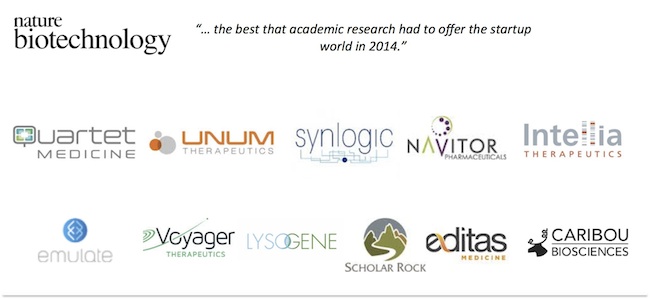This afternoon Nature Biotechnology published its annual review of the “some of the best that academic research had to offer the startup world in 2014.” The article, in the March 2015 issue, covers the editors’ selections of the top startups – and this year they picked eleven companies to highlight across cancer, gastrointestinal, fibrosis, pain, and rare disease areas.
By way of background, Nature Biotechnology is the most widely cited journal for biotech, ranked #1 by “impact factor” (here), and its editors drove the startup selection process. Their methodology involved evaluating the list of new startups that raised significant Series A rounds last year, as “substantial funding” was their view of “commercial excitement” or validation. Then they selected companies where the underlying science was derived from academic labs and was sufficiently innovative to be compelling – essentially their editors’ assessment of the most exciting science. Nature senior editor Laura DeFrancesco and her colleague Aaron Bouchie then wrote up narratives describing each of the companies.
We’re honored and excited this year to announce that five out of eleven startups highlighted by Nature Biotechnology are in our Atlas Venture Fund IX portfolio. This came as an unexpected surprise, including to the Nature Biotech editors, who reached out to let us know before we’d stitched together the news from our portfolio companies.
Running through the quick narrative on the Atlas five, highlighting the Nature Biotech tagline in quotes:
Quartet Medicine: “genetics hits a nerve”. Focusing on the role of the BH4 pathway in regulating pain responses, as implicated by human genetics, Quartet was founded around the work of Clifford Woolf (Boston Children’s Hospital) and Kai Johnsson (EPFL). Atlas EIR Kevin Pojasek, also a co-founder, led the company through its formative seed phase and helped raise a Series A round with Novartis Ventures and Pfizer Ventures. He introduced the Quartet story in a From The Trenches post last fall (here).
Unum Therapeutics: “universal cellular immunotherapy”. Unum is engineering T-cells to engage tumor-directed antibodies to harness the power of the immune response in a modular, universal fashion. Shortly after closing the Series A financing with Atlas, Fidelity Biosciences, and Sanofi-Genzyme Bioventures, Unum started dosing patients in its first clinical trial (here). Chuck Wilson is the CEO and co-founder, along with Dario Campana at NUS; Chuck is a serial Atlas entrepreneur (prior stint as founder of Archemix, an Atlas VI company) and former Novartis executive. This blog previously introduced Unum Therapeutics after the Series A financing (here), and Chuck has written his debut From The Trenches blog on “Better Living Through T-Cells (here).
Synlogic: “smart bugs and smart drugs”. Combining the worlds of synthetic biology and the microbiome, Synlogic is working on creating therapeutic bugs that locally detect and treat specific diseases. The co-founders are luminaries in the field of synthetic biology, Jim Collins and Tim Liu, as well as Atlas’ EIR Ankit Mahadevia. We closed a Series A round with NEA and the Bill & Melinda Gates Foundation in the second half of 2014; this blog introduced the Synlogic story back in October (here).
Navitor Pharmaceuticals: “refining mTOR drug targeting”. Building off of insights from its scientific founder, David Sabatini, Navitor is focused on selective modulation of mTORC1 (one of the two main mTOR complexes) and its role in nutrient sensing. Led by George Vlasuk, a former Wyeth and GSK executive (and former Atlas EIR), Navitor has raised its Series A financing from Atlas, Polaris, J&J, and SR One Ventures – this capital should help advance several programs against mTOR and related targets.
Intellia Therapeutics: “turning CRISPRs into drugs”. Our therapeutic gene editing startup, founded by Atlas and Caribou Biosciences (another Nature Biotech highlighted startup). Novartis Institutes of Biomedical Research (NIBR) is our co-investor, and, a few months after the Series A closing, we struck a major R&D collaboration with NIBR to power up Intellia’s CRISPR platform (here). Intellia is led by Atlas EIR Nessan Bermingham and a team of accomplished R&D executives (here).
It’s also an honor to have our five startups alongside such great “company”, including a number of executives very close to the Atlas family:
- Third Rock’s Voyager Therapeutics, led by former Lilly executive Steve Paul, and Lysogene, out of Paris, are both developing novel CNS-focused gene therapies.
- Intellia is joined by fellow CRISPR companies Editas (led by Katrine Bosley, former CEO of Avila, an Atlas VII portfolio company, and also a former EIR at Atlas) and Caribou Biosciences.
- Scholar Rock, led by Nagesh Mahanthappa (formerly of Atlas’ VI and VII portfolio companies Alnylam and Avila), is focused on “shutting off the TGF-b spigot” through niche-directed modulators.
- Emulate, led by Geraldine Hamilton, is working on “Organs on Chips” platform, with in vitro systems connected via microfluidics, based on pioneering work from the Wyss Institute’s Don Ingber.
Lastly, I thought it worth noting that although location wasn’t a factor in the editors’ selection process, they ended up with nine Cambridge-based companies. Only Lysogene and Caribou were outside of Massachusetts. Further, many of these startups derived their founding intellectual property or know-how from outside of the region: Intellia, Quartet, Unum, Navitor, and Voyager (and perhaps others) have significant scientific founder relationships elsewhere. This small dataset is just further reinforcement of the virtuous cycle at work in the Boston cluster around the starting and launching of new biotechnology ventures – it’s become the epicenter of biotech startups.






